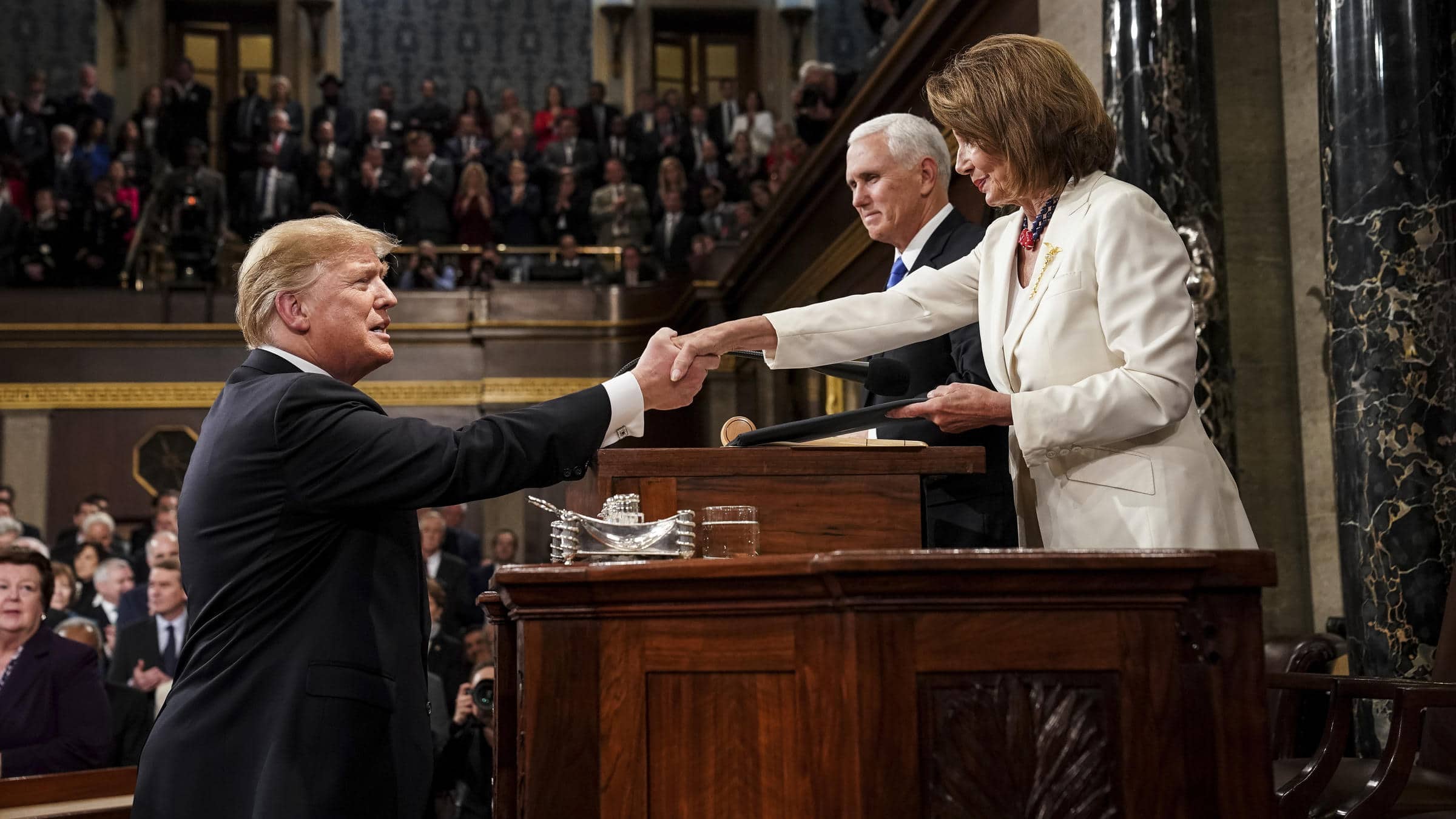The Speaker’s willingness to get in the President’s face has made many a meme, but their conflict has more to say about our constitutional checks and balances.
On January 23, 2017, Donald Trump’s fourth day as President, he met with congressional leaders in the State Dining Room of the White House. “You know, I won the popular vote,” he started off, and then repeated the calumny that Hillary Clinton had received three to five million illegal votes, owing to fraud. “That’s not true,” Nancy Pelosi replied, according to “A Very Stable Genius,” the recently published account of the Trump Presidency by the Washington Post reporters Philip Rucker and Carol Leonnig. “If we’re going to work together,” Pelosi said, “we have to stipulate to a certain set of facts.” Steve Bannon, then Trump’s chief strategist, who was in the room, whispered to colleagues, “She’s going to get us. Total assassin.”
Pelosi did become one of Trump’s most unflinching adversaries, in part because she grasped early on that invitations to his White House are often just call sheets for unscripted television; her finger-jabbing readiness to get in Trump’s face has made her a recurring meme of the Democratic resistance. She offered her most vivid performance yet on February 4th, during the President’s third State of the Union address. As Trump spoke, Pelosi, wearing suffragist white, sat behind him in the high-backed chair reserved for the Speaker of the House of Representatives, and conspicuously shuffled and reshuffled a printed copy of the President’s speech. After he finished, she tore the text in half. Twitter blew up, as the Speaker had clearly intended; she explained that she had abandoned decorum because Trump’s speech “was a manifesto of mistruths.”
Hashtag wars are the President’s terrain, however; the conflict between Pelosi and Trump matters most for what it says about the questionable health of the Constitution’s system of checks and balances. After the 2018 midterm elections, when Democrats regained control of the House but not the Senate, Pelosi, who will turn eighty in March, was elected House Speaker, overcoming opposition from progressive and younger representatives by promising to relinquish her post by 2022. Last year, as the Mueller investigation wound down, Pelosi resisted calls from many Democrats to launch an impeachment inquiry. She argued that the idea lacked public support, even as the Mueller report turned out to be damning, particularly in its litany of examples of likely obstruction of justice. Pelosi’s judgment seemed to be grounded in political realism: even if the President were impeached, the chances remained slim to vanishing that the Republican-controlled Senate—cowed by Trump’s base and by allied demagogues on the airwaves—would convict and remove him from office by the necessary two-thirds vote. Why impeach Trump if he could describe an acquittal as vindication, using it to denounce his enemies and to rally his following?
Last September, after the Ukraine matter broke, Pelosi concluded—at the urging of both progressives and centrists in her House caucus—that this time the evidence was different. Trump’s abuse of U.S. military aid and economic power to coerce Ukraine to investigate Joe Biden, she said, had crossed a line from “bad behavior” to presenting “a challenge to our Constitution.” The House hearings that followed, despite a hurried schedule and White House obstruction, created a convincing record of Trump’s blithe disregard of a President’s duty to place the national interest before his own. For all its political risks, Pelosi told the Times early this month, the impeachment investigation succeeded, because it “pulled back a veil of behavior totally unacceptable to our founders. . . . The public will see this with a clearer eye, an unblurred eye.” She implied that such clarity would shape the judgment of voters in November, but she also seemed to acknowledge uncertainty about the coming election: “Whatever happens, he has been impeached forever.”
When the Senate exonerated Trump, this week, following his brief and witness-free impeachment trial, the most striking reminder of the constitutional issues at stake was provided by Mitt Romney, the Republican Presidential nominee in 2012, as he joined a united Democratic caucus to vote for Trump’s conviction on the article charging abuse of power. In eloquent remarks, he described the President’s conduct as “a flagrant assault on our electoral rights, our national security, and our fundamental values.” He went on, “Corrupting an election to keep oneself in office is perhaps the most abusive and destructive violation of one’s oath of office that I can imagine.”
By Steve Coll, The New Yorker. Read the full article
Redazione
La redazione di Babilon è composta da giovani giornalisti, analisti e ricercatori attenti alle dinamiche mondiali. Il nostro obiettivo è rendere più comprensibile la geopolitica a tutti i tipi di lettori.
Se le questioni di genere dettano le agende di politica estera
19 Dic 2024
Il perseguimento di politiche identitarie da parte dell'establishment della politica estera occidentale sta portando a…
La crisi della democrazia negli Stati Uniti
14 Lug 2024
Che America è quella che andrà al voto il 5 novembre 2024 per eleggere il suo presidente? Chi vincerà lo scontro tra…
Il mondo al voto. Il futuro tra democrazie e dittature
18 Gen 2024
Il 2024 è il grande anno delle elezioni politiche nel mondo. Dopo Taiwan la Russia, l’India, il Regno Unito, l’Unione…




